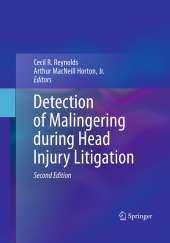 Neuerscheinungen 2016Stand: 2020-02-01 |
Schnellsuche
ISBN/Stichwort/Autor
|
Herderstraße 10
10625 Berlin
Tel.: 030 315 714 16
Fax 030 315 714 14
info@buchspektrum.de |

Arthur MacNeill Horton, Cecil R. Reynolds
(Beteiligte)
Detection of Malingering during Head Injury Litigation
Herausgegeben von Reynolds, Cecil R.; Horton, Arthur MacNeill
2. Aufl. 2016. xii, 381 S. 30 Tabellen. 254 mm
Verlag/Jahr: SPRINGER, BERLIN; SPRINGER US; SPRINGER 2016
ISBN: 1-489-97878-X (148997878X)
Neue ISBN: 978-1-489-97878-3 (9781489978783)
Preis und Lieferzeit: Bitte klicken
This revised second edition reflects a continuing dearth of literature exploring ways of differentiating between conversion (and conversion-like disorders) and malingering in cases of head injury. Neuropsychologists need this systematic, scientific resource.
Increased public awareness of traumatic brain injuries has fueled a number of significant developments: on the one hand, more funding and more research related to these injuries and their resulting deficits; on the other, the possibility of higher stakes in personal injury suits-and more reasons for individuals to feign injury. Expanding both the conceptual and clinical knowledge base on the subject, the Second Edition of Detection of Malingering during Head Injury Litigation offers the latest detection tools and techniques for veteran and novice alike. As in its initial incarnation, this practical revision demonstrates how to combine clinical expertise, carefully-gathered data, and the use of actuarial models as well as common sense in making sound evaluations and reducing ambiguous results. And, the book navigates the reader through the many caveats that come with the job, beginning with the scenario that an individual may be malingering despite having an actual brain injury. Among the updated features: -Specific chapters on malingering on the Halstead-Reitan, Luria-Nebraska, and MMPI-2. -A framework for distinguishing genuine from factitious PTSD in head injury cases. -Detailed information regarding performance on the WMT, MSVT, and NV-MSVT by children with developmental disabilities. -Guidelines for explaining symptom validity testing to the trier of fact. -Entirely new chapters on mild TBI and on malingering of PTSD symptoms in the context of TBI litigation. Professional neuropsychologists and forensic psychologists will appreciate this new edition of Detection of Malingering during Head Injury Litigation as an invaluable source of refinements to their craft, and improvement as an expert witness.
Chapter 1.- Assessment of Malingering and Falsification: Part one, Pushing to the Boundaries of Knowledge and Clinical Practice-Conceptual Issues.- Chapter 2. Assessment of Malingering and Falsification: Part two, Pushing the Boundaries of Knowledge and Clinical Practice-Clinical Application.- Chapter 3. Noncredible Performance in Mild Head Injury.- Chapter 4. Detection of Malingering Using Forced-Choice Techniques.- Chapter 5. Fractitious Responding and Malingered Memory Disorder.- Chapter 6. Performance on the WMT, MSVT & NV-MSVT in Children with Developmental Disabilities and in Adults with Mild Traumatic Brain Injury.- Chapter 7. Detecting Malingering on the Luria-Nebraska Neuropsychological Battery.- Chapter 8. Detection of Malingering and Invalid Test Results Using the Halstead-Reitan Battery.- Chapter 9. Detection of Feigning of Head Injury Symptoms on the MMPI-2.- Chapter 10. Explaining Symptom Validity Testing to the Trier of Fact.- Chapter 11. Distinguishing Genuine from Malingered Posttraumatic Stress Disorder in Head Injury Litigation.- Chapter 12. Clinical Detection of Malingering.- Chapter 13. Clinical Acumen, Common Sense, and Data Based Decision Making: Actuarialism in the Detection of Dissimulation During Head Injury Litigation.- Index.


